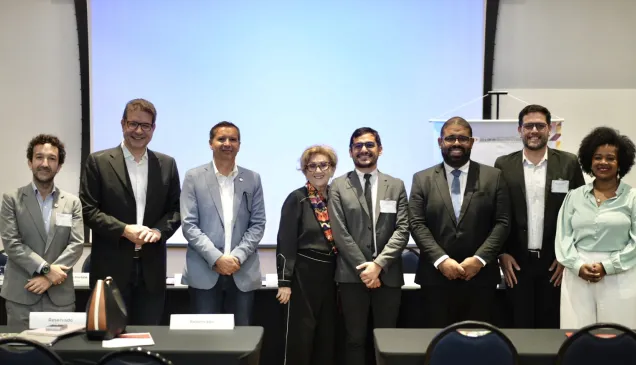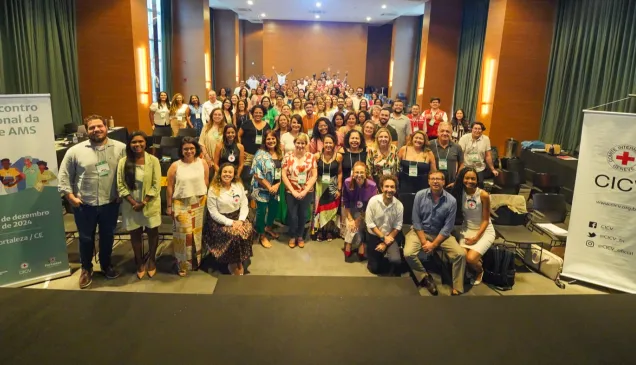“Cooking is also remembering”: Renewed efforts for the missing in Brazil

With more than 81,000 disappearances reported in Brazil last year, the Brasilia Regional Delegation continues its work to highlight the long-term impact of disappearance on families, advocating for better documentation, public awareness and support systems. As part of these efforts, and in collaboration with the National Movement of Missing Persons, published Sabor da Saudade, a cookbook inspired by families of the missing.
“When the skies turned grey in my hometown, my sister would say, ‘I got goosebumps three times – you better make noodle soup with beans for me,’” recalls Gislaine Ferreira da Silva Nascimento. The dish, humble and warm, now carries a weight far beyond its ingredients. Gislaine’s sister, Graciane, disappeared in 2005, at the age of 18. Her story – and her soup – are part of Sabor da Saudade, a cookbook that weaves recipes and memories, giving voice to those who live in the shadow of absence.
“Saudade” is a unique Portuguese word that describes deep emotional longing or nostalgia, often for something or someone that is gone, distant or missing, and as Debora Alves Inacio explains, “this book is a translation of that feeling.” Her son, Kaio, disappeared in 2013 at age 17. “It’s a reminder of Kaio, but it’s also a way of saying: we’re still here. We resist being forgotten.” Kaio’s favorite dish, which he used to prepare himself, was a sweet of milk.
A blend of gastronomy, memory and storytelling, Sabor da Saudade is part of the Brasilia Regional Delegation ongoing efforts to bring visibility, dignity and humanity to the issue of missing persons in Brazil. It offers more than comfort food, it’s a tribute to memory, a form of resistance and a call for visibility in a country where disappearances go undocumented – and unacknowledged.
Each recipe in the book tells a story: a favorite dessert, a breakfast ritual, a simple meal made with love – and now made with longing. For families like Gislaine’s and Debora’s, the act of cooking has become a way of remembrance, the kitchen their sanctuary.
The preface of the book was written by Marcelo Rubens Paiva — author of the memoir that inspired the film I’m Still Here, that tells the story of the disappearance of his father, congressman Rubens Paiva, who went missing in 1971 during Brazil’s military regime.
"This book recognizes the strength and resilience of the families of missing persons. Acts of memory help preserve the identity and history of the missing, ensuring that their lives are not reduced to the condition of being 'absent’” says Marta Gomes de Andrade, Protection Coordinator at the Brasilia Regional Delegation.
To honor the families who shared their stories and recipes, the ICRC hosted an intimate dinner prepared by renowned chef Rodrigo Oliveira. The menu featured dishes from the book — a gesture made more meaningful by Oliveira’s own painful experience of having two missing relatives, infusing each plate with empathy and strength.

A growing institutional response
One of the priorities of the Brasilia Regional Delegation is to support authorities in preventing and addressing the issue of missing persons, while also working to mitigate the consequences of disappearances for families affected by armed violence. As the book was launched in Brasília, a parallel development unfolded in Brazil’s judicial system. In a unanimous vote, the National Council of Justice (CNJ) approved a groundbreaking resolution establishing a judicial policy to better support families of missing persons. The measure, recognizing the relatives of missing persons as directly affected, was the result of the third Meeting on the Legal Aspects of Disappearance, co-organized by the ICRC and the CNJ/UNDP Plural Justice program in June 2025, and calls for a more humane, faster and accessible justice system.
Key priorities include qualified listening, non-revictimizing procedures, expedited case processing, accessible language use and multidisciplinary institutional coordination.
Reinforcing the same commitment to systemic change, the Ministry of Justice and Public Security, with the support of the ICRC’s recommendations and experiences, launched the first National Registry of Missing Persons, aimed at unifying and cross-referencing information across federated states, thus strengthening investigations and improving resolution rates. The ICRC was present at the opening session of the launch ceremony, alongside high-level officials and representatives of the National Movement of Families of Missing Persons, whose participation was facilitated by us.
A forensic effort that searches for answers
The Brasilia Regional Delegation has taken a multidisciplinary approach to respond to the issue of the missing in Brazil, spanning protection, legal, mental health, technology and forensics expertise to help state and federal authorities build mechanisms for locating missing persons, handling mortal remains with dignity and connecting families to needed services.
Aware of the importance of forensic work in ending the anguish of families of missing loved ones, have – together with their partners – the Brasilia Regional Delegation led and organized this year’s National Meeting of Medical Examiner Institutes (ENIMLs), held during InterForensics 2025 in Paraná. The meeting emphasized the importance of better national coordination, stronger identification protocols and proper management and identification. Yet, despite ongoing efforts to unify data, standardize procedures and humanize services, differences in capacity and resources between federated states continue to pose challenges.
Recognizing the emotional toll of the identification process, this year’s ENIMLs included a national workshop on supporting families during one of their most painful moments. Developed by the ICRC’s Mental Health and Psychosocial Support Program, it reflected needs expressed by both relatives and forensic staff.
“Many relatives arrive already expecting the worst,” said Renata Reali, who leads the ICRC’s psychosocial efforts in Brazil. “But the way they’re received can either ease their pain or deepen it. We want to prepare professionals to offer humane and compassionate support.”
As efforts advance across legal, forensic and social spheres, it becomes increasingly clear that the issue of missing persons in Brazil is no longer limited to statistics or unresolved case files. It is now embedded in public policy, forensic system reforms and even in everyday family rituals, in a recipe passed from one generation to the next, sustained not only by memory, but by the persistence of those who refuse to forget.



